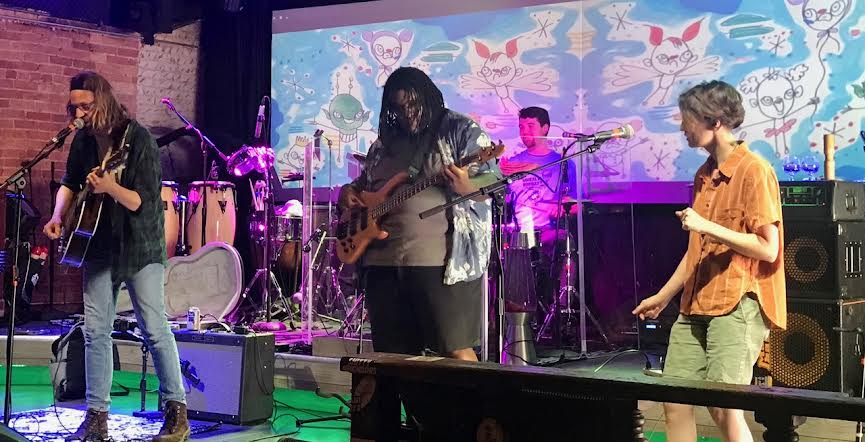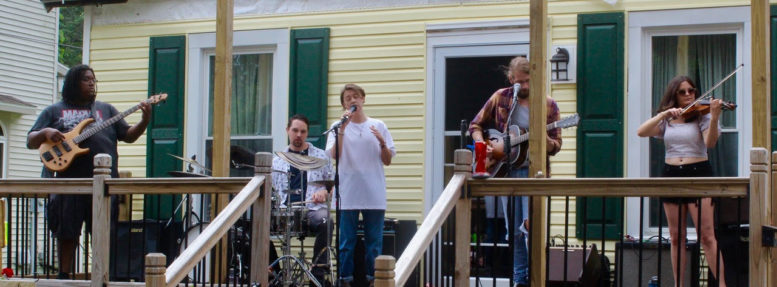By DAVID DUPONT
BG Independent News
Maybe it’s not surprising that a band driven by a couple musical storytellers has a few origin stories.
Was it at the Ottawa Tavern in Toledo? Or at the Black Swamp Arts Festival? Or the Cigar Shop in Waterville? 2017? 2018? Even earlier?
Tom Vasey recalls that before the show at the Ottawa Tavern in August they all huddled up, extended their hands and then shouted ‘Let’s go!’”
That’s as good a place to start as any. Freight Street has been on the go since.
The quintet delivered its first LP in early 2020 and then the pandemic closed down opportunities to promote it with live shows. Now, back in action, Freight Street has issued two singles “Longshot” and “Drivin’” with more to come. (Click to purchase.)The plan is to collect them into an EP that will be released at the end of the year.

Complicating the origins is the history of collaborations among the members. Vasey, who performs as Boo Lee Crosser when he’s solo, brought in fellow songwriter Flannery Murnen and bassist and cellist Devonte Stovall. Murnen joined the BGSU Roots Music Club back in 2015 as a senior at BG High, where they met and played with other future members of Freight Street.
Stovall and JP Stebal have been sharing bandstands since their days as with BGSU jazz ensembles, and then with The Barncats and Tree No Leaves as well as each other’s jazz gigs.
When Vasey wanted to fatten up the sound for a rock show, he recruited Stebal who suggested bringing violinist Kathleen Schnerer along. She added not just her violin but a classical music dimension to the sound.
“We’re all friends,” Murnen said.
Freight Street has as many descriptions of its genre as it does origin stories – folk core, indy pop, punk, blues or any others that apply.
“We’re all trying to push the boundaries with improv,” Stebal said in a recent interview with the band.
The name of the band comes from one of Vasey’s songs, “Freight Street” from his solo album “New Bedford.”
The song and title capture the “Rust Belt” aesthetic of the band, said Murnen.
Vasey and Murnen are the songwriters and lead singer. Vasey’s voice has a gritty, Midwest twang. Murnen’s voice sounds preternaturally aged, like a fine bourbon.
Sometimes, Schnerer said, the songs they bring in are “bare bones” and “sometimes they’re complete and we add our little touches on top of it.”
Recently they’ve just jammed, Murnen said. Stovall and Stebal will lay down a groove, and Murnen will pull out their phone. “I’ll just start spitting out whatever comes to mind or what I wrote earlier in the day and sees what works, just test things out.”
Murnen said they’re constantly writing. If Murnen doesn’t get the idea down when it first comes to them, it’s likely lost forever.
Vasey has a similar approach. “I use my notes on my phone a lot and try to journal a lot. It’s a strategy for mental health and for writing purposes.”
Vasey tries to get a song written every week, otherwise he said, he just ends up with a bunch of fragments.
The songs reflect the life they spring from. They are laced with details of love, loss, love lost, family, longing and struggles inherent in the milieu of the Midwest.
For the songwriters, the band offers a broader instrumental palette, but it also is a challenge.
“I was always very protective of my writing,” Murnen said. “When you are a budding songwriter you treat all your songs like a child.” Visual artists are the same. Murnen studied art at BGSU and “every single professor said ‘don’t baby your work.’”
With Freight Street, Murnen said, “my art is made much richer by the experience of others and their take on it. It becomes owned by the community, the band and the audience. It becomes a collective experience.”
Vasey said Freight Street has evolved from the early days of Murnen and himself out front to being “a band.”
He recalled what Professor Jeff Halsey said in an introduction to jazz course: “What makes a really great band is when you sound like one instrument.”
“We all collectively have a role in building it up,” Stovall said.
Vasey credits Stovall with enriching the harmonies and fashioning lyrical bass lines.
Stebal has a knack for finding spots in the songs that need group vocals. He likes to sing, he explained, but isn’t a lead voice.
Schnerer has extensive classical training that started very early with lessons in the Suzuki method. That system has students playing by ear before they learn to read music. She credits that ear training with being able “to slide around and find something that fits.”
And, she added about her bandmates: “These people have pushed me out of my classical comfort zone more than any other musicians I have played with, and I love them for that. … All five of us have a lot of creative liberties in the group, and all of us enjoy each other’s creative ideas.”
And “after two years of going inward,” Murnen said, they find themselves “craving that connection with other people. I certainly feel that way after pandemic, just craving to feel like we belong together again.”
Freight Street is extending its touring range this summer with gigs in Michigan, Pennsylvania and Cleveland.
On Saturday Sept. 10, Freight Street will be back home playing three sets at the Black Swamp Arts Festival opening on the Main Stage at noon.

